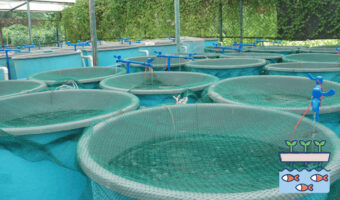Introduction to Aquaculture: Principles and Practices
About This Course
The course “Introduction to Aquaculture: Principles and Practices” provides a comprehensive introduction to the field of aquaculture, focusing on the fundamental principles, techniques, and practices involved in the cultivation and management of aquatic organisms. This course is designed to equip participants with a solid understanding of the basic concepts and processes involved in aquaculture, enabling them to pursue further studies or careers in the field.
Through a combination of theoretical knowledge, practical demonstrations, and hands-on experiences, participants will explore various aspects of aquaculture. They will learn about different aquaculture systems, species selection, site selection, water quality management, and the overall management and operation of aquaculture facilities.
The course will cover topics such as the history and development of aquaculture, the role of aquaculture in global food production, and its significance in meeting the increasing demand for seafood. Participants will gain insights into the environmental, economic, and social aspects of aquaculture and its potential for sustainable food production.
Furthermore, participants will learn about the basic principles of aquatic animal biology and physiology, including reproduction, growth, and nutrition. They will understand the different life stages of aquatic organisms and the specific requirements for successful cultivation.
In addition, participants will explore the management of water quality in aquaculture systems, including monitoring parameters, water treatment techniques, and the prevention and control of common waterborne diseases. They will also gain an understanding of the environmental impact of aquaculture and the importance of responsible and sustainable practices.
Throughout the course, participants will engage in field visits, practical exercises, and case studies to apply their knowledge and develop practical skills in aquaculture. They will have the opportunity to learn about aquaculture facility design, stocking procedures, feeding practices, and basic aquaculture production techniques.
By the end of the course, participants will have a foundational understanding of aquaculture principles and practices. They will be equipped with the knowledge and skills to comprehend the complexities of aquaculture, identify key factors for success, and contribute to the sustainable development and management of aquaculture systems.
Note: The course description provided is fictional and serves as an example. The actual course description may vary depending on the educational institution or program
Learning Objectives
Material Includes
- E-Books
- Guide Papers
- Certificate of Completion
This course is best for:
- Students: Undergraduate or postgraduate students studying aquaculture, fisheries, marine science, biology, environmental science, or related disciplines will find this course valuable. It offers them a comprehensive introduction to the principles and practices of aquaculture, complementing their academic studies.
- Aquaculture Practitioners: Individuals working in the aquaculture industry, including aquaculturists, fish farmers, farm managers, and technicians, can enhance their knowledge and skills through this course. It provides them with a solid foundation in aquaculture principles and best practices, enabling them to improve their aquaculture operations.
- Fisheries Professionals: Fisheries officers, fisheries managers, and individuals involved in fisheries management and conservation will benefit from this course. It offers them insights into the role of aquaculture in sustainable seafood production and the integration of aquaculture with fisheries management approaches.
- Environmentalists and Conservationists: Individuals passionate about environmental sustainability and the conservation of aquatic ecosystems will find this course informative. It offers them an understanding of responsible aquaculture practices, environmental impacts, and the potential for sustainable aquaculture to contribute to conservation efforts.
- Researchers and Academics: Researchers and academics engaged in aquaculture research, fisheries science, marine biology, or related areas will benefit from this course. It provides them with foundational knowledge of aquaculture principles and practices, allowing them to conduct informed research and teach relevant topics.
- Policy Makers and Government Officials: Policy makers, government officials, and individuals involved in fisheries and aquaculture policy development and regulation will gain valuable insights from this course. It offers them a comprehensive understanding of aquaculture principles, environmental considerations, and sustainable practices to inform policy decisions.
- Please note that the specific prerequisites and level of detail covered in the course may vary depending on the educational institution or program offering the course.






